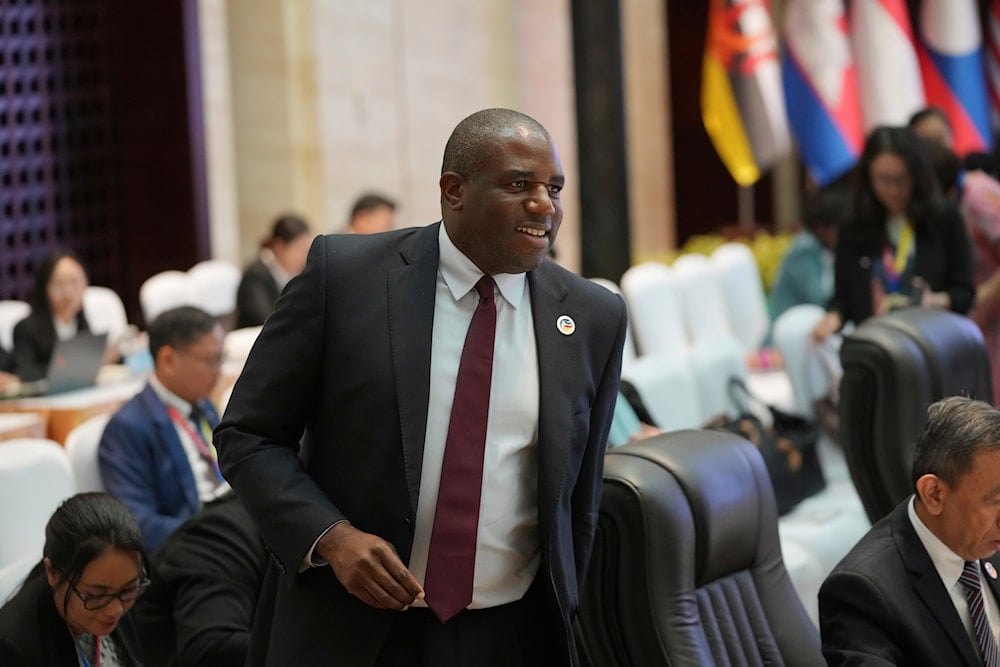New UK government faces more pressure to cease arms sales to 'Israel'
The British government has yet to completely commit to the more significant shift that the public is calling for, which is the cessation of arms shipments to "Israel".
-

British Foreign Secretary David Lammy arrives for the ASEAN Post Ministerial Conference in Vientiane, Laos, Friday, July 26, 2024. (AP)
David Lammy, the UK's newly appointed foreign secretary, declared just two weeks after the country's elections this year that the United Kingdom will resume its funding UNRWA, the United Nations organization that looks after Palestinian refugees, following it was baselessly accused by "Israel" of its members partaking in Operation Al-Aqsa Flood.
The government also declared a week later that it was abandoning its earlier preparations to contest the International Criminal Court's authority to issue an arrest warrant for Israeli Prime Minister Benjamin Netanyahu and Security Minister Yoav Gallant due to war crimes by "Israel".
However, the British government has yet to completely commit to the more significant shift that the public is calling for, which is the cessation of arms shipments to "Israel".
Read more: 600 UK officials say arming 'Israel' breaches international law
Recently, Mark Smith, a counterterrorism official at the British Embassy in Dublin, relayed to his colleagues after submitting his resignation, “Each day we witness clear and unquestionable examples of War Crimes and breaches of International Humanitarian Law in Gaza perpetrated by the State of Israel”.
He added, “There is no justification for the UK’s continued arms sales to Israel, yet somehow it continues. I have raised this at every level in the organization … As a fully cleared officer raising serious concerns of illegality in this Department, to be disregarded in this way is deeply troubling. It is my duty as a public servant to raise this.”
A July YouGov poll found that 58% of Brits are in favor of stopping military supplies to "Israel" during the war on Gaza, with only 18% against. Even more people (78%) are in favor of an immediate ceasefire.
Surpassing the law
Human Rights Watch's UK director, Yasmine Ahmed, tells TIME that while the British government may be hesitant to restrict these weapons the law is obvious.
“There are no caveats or defenses or exemptions for the requirement to suspend when there is a clear risk that UK military equipment might be used to facilitate or carry out serious [human rights] violations,” she said, adding, “If that threshold is met, then they have to be stopped, irrespective of whether that same equipment could be used for defensive purposes.”
According to Ahmed, the UK choosing to stop arms exports to "Israel" would allow it to register its disapproval of its conduct in Gaza, while also increasing pressure on "Israel's" other allies and arms suppliers, mainly Germany and the US.
“It’s easier to make clear your commitments to international law on positions that aren’t significantly contentious and where you’re going to get very significant pushback,” Ahmed said, according to TIME. “But really, your commitment to international law is proven in situations, and particularly in situations like this, where there will be pressure but also where the consequences of not doing so are so dramatically significant.”
This week, lawyers submitted harrowing claims to the High Court in London, stressing that Palestinians are being tortured, denied medical treatment in hospitals, and trapped under relentless bombardment, according to a report by The Guardian. The submission is part of a legal bid to stop the UK government from issuing arms export licenses to British companies supplying weapons to "Israel".
The legal submission includes 14 witness statements spanning over 100 pages, featuring testimonies from Palestinian and Western medical doctors working in Gaza’s hospitals, along with accounts from ambulance drivers, civil defense personnel, and aid workers.
The graphic evidence aims to bolster a request for a court order arguing that the UK government’s refusal to ban arms sales is irrational, as it claims there isn’t a clear risk of these weapons being used in breaches of international humanitarian law. According to The Guardian, this is the statutory test the government must apply when deciding whether to grant arms export licenses. The Labour government is currently reviewing this policy.
The previous Conservative administration defended its decision to continue granting arms export licenses, arguing that there was insufficient evidence to conclude that UK weapons were being used in war crimes.

 4 Min Read
4 Min Read








